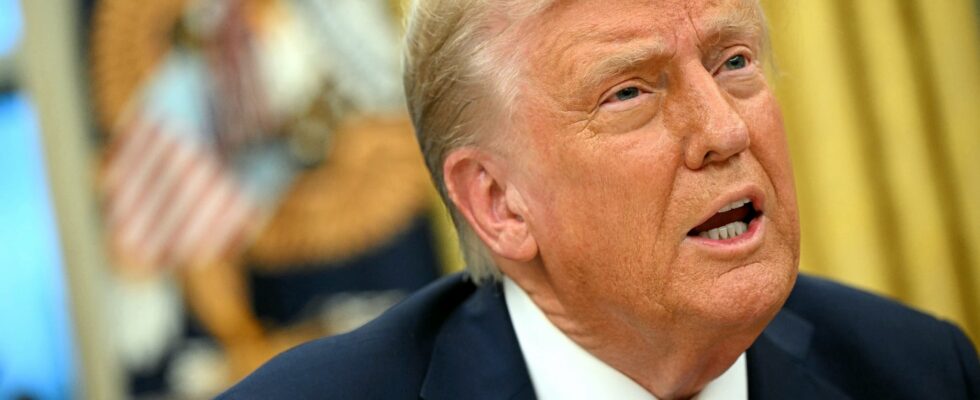As promised, Donald Trump signed a series of decrees on Saturday to tax imports from the main trade partners of the United States-Canada, China and Mexico [NDLR : les Etats-Unis ont finalement suspendu leurs tarifs douaniers pour un mois, a annoncé le président américain ce lundi]. On the grounds, largely fallacious, to fight against drug trafficking, he intends to limit imports to force the rest of the world to buy more American exports. This is the old mercantilist idea that makes its return: the richness of a country holds entirely in its ability to sell to others without buying anything. Produce everything on your own.
And the idea is exported with an astonishing virality. Justin Trudeau has already announced an increase in customs taxes on American imports. China is preparing. While Europe wonders. Everywhere, we think about reprisal measures. “It is a good war” would be tempted to say to yourself. After all, we’re not going to be punished without saying anything. The race for customs barriers is “the eye for a tooth eye for” international trade “. Faced with the protectionism of others, you have to protect yourself well.
Relationship between free trade and prosperity
Except there is a hic. Free trade is a key element in prosperity. This is what Arvind Panagariya demonstrated in Free Trade and Prosperity: How OpenNess Helps the Developing Countries Grow Richer and Fight Poverty (2019). From a synthesis of the immense literature on the subject, the economist observes that wherever growth and income by individual have increased, customs barriers have first decreased. In this regard, he recalls that in the late 1950s, the richness of Ghana was identical to that of South Korea, but that the protectionism of the first prevented him from taking off where the economic opening of the second in made a champion of globalization. Ditto for India which, under the influence of economist Jadhish Bhagwati, has made a complete reversal of its commercial policy to open up to free trade, starting the start of what economists call “the Indian miracle” .
The relationship between free trade and prosperity is nothing mysterious. From the 18th century, Adam Smith, Jean-Baptiste Say then David Ricardo, had provided the explanation which, since then, has continued to be verified: free trade is the only way to take advantage of what others have To offer while discovering what you can get them yourself. Without opening up, it is impossible to know what to produce, where to invest or what to create and invent. Free trade is a market that overflows national borders; The scale changes, but the principle remains the same: a process of discovery without which, one cannot neither what the peoples want, nor how to provide them. Hence an obvious conclusion: protectionism is to international exchanges what the plan is to the national economy, the surest means of being approached.
Customer in a supermarket
In this regard, in an article published in the famous Journal of Economic Perspectives (The Impact of the 2018 Tariffs On Prices and Welfare, 2019) Mary Amiti, Stephen Redding and David Weinstein have shown that the customs barriers imposed by the Trump administration in 2018 had proven to be catastrophic for the Americans. The increase in import taxes having been fully reflected in products of products, reducing the purchasing power of consumers and leading to a drop in national income of $ 1.4 billion per month. Better still, the authors observe that all the countries that applied reprisal measures have undergone similar damage.
It is that, as Milton Friedman explained in one of his program programs Free to chooseto understand the true impact of protectionism, the easiest way is to place yourself in the situation of a customer in a supermarket. Praking his cart in a protectionist store, he has all the money in the world – since he exported his products – but the shelves are empty – everything has been sold elsewhere. While stalls overflow from all products in the world in a store open to imports. Real wealth is having access to everything at the best price, whatever the manufacturing location. This is why, as Branko Milanovic shows, it is only once the globalization has become mature that global growth has truly taken off and the differences in wealth has decreased.
Liberalism in the face of Trumpism
The moral of economic history, ancient and recent, is therefore quite simple: that Donald Trump decides to reduce the well-being of his fellow citizens should not encourage leaders of other countries to do the same. On the contrary. Europeans have everything to gain from taking advantage of the handicap that the Americans impose, to multiply partnerships, to open more, and to win the bet. Since the Americans have forgotten the virtues of free trade and sincerely believe that only exports have value, we must continue to buy at low prices what they have decided to sell off and seize this opportunity to produce what they do not can help importing.
Concretely, the increase in American customs taxes, the European Union must respond with more free trade. Strengthening the links made by CETA with Canada, increasing the opening to Mercosur, multiplying agreements with all countries wishing to buy its products and its know-how, to offer so many outlets to European companies that will be able to enrich and hire. In short, take the place left vacant by the United States Rabougris. Since generalized protectionism makes the world economy a zero -sum game, the union has nothing to gain from isolate itself.
After all, “eye for an eye” does not mean shooting yourself in the foot when another does it. This is at best follow -up, at the worst of masochism. That American citizens have decided to close the door to prosperity should encourage Europe to open up. To withstand the trumpeismthe safest way is therefore still liberalism.
*Pierre Bentata is a lecturer at the Aix-Marseille University law faculty. He has just published The winner’s curse (The observatory).
.
